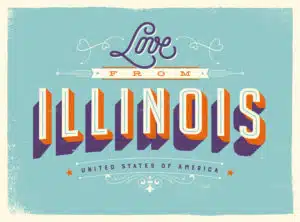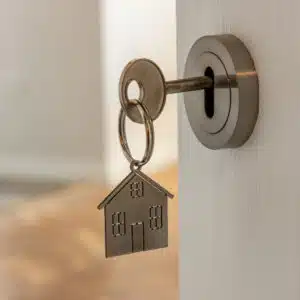Illinois’s state-level economic concerns, increasingly expensive real estate prices in and around Chicago, its mix of dense urban and large rural areas, and the state’s position as a major economy in the region may also impact real estate prices.
An understanding of local and national economic and regulatory factors can help prospective homeowners understand the overall market. To learn more about how to find competitive mortgage rates in Illinois and make the best possible choice for your needs, read on.
Elements That Affect Mortgage Rate & Refinance Rates in IL

While still lower than the national median value of $436,800 shared by the St. Louis Fed FRED Economic Data, rising prices make it that much more crucial to find competitive mortgage rates.
Zillow predicted steady growth of home prices through the end of 2019, exceeding $190,000 by the end of the year.
That increase will likely come from a combination of national economic factors, such as interest rates and economic performance, and state-level economic considerations, such as lender competition and potential regulatory changes.
Understanding current mortgage rates in Illinois can help you make the most informed and financially responsible decision about which lender and loan type is best suited to your needs.
Rates, terms, and other conditions can change greatly from one lender to the next, and there are similar differences between the options offered by individual providers.
The more you know about mortgage rates in Illinois, as well as the personal factors that influence critical elements such as interest rates and down payments, the more confident you can be in your decision.
The end result can mean saving thousands of dollars over the life of the mortgage through reduced interest rates and other advantages. When it comes to home loans, the time invested in research can definitely pay off.
Loan Type
There are many types of home loans available in Illinois and throughout the country. Even a traditional mortgage includes a variety of options that have a substantial impact on interest rates and the overall mortgage costs, from the length of the loan term to the choice of a fixed or adjustable rate. There are also a number of more specialized offerings backed by various government agencies. These loans, such as the ones offered by the Department of Veterans Affairs and the Federal Housing Administration, require some special qualifications. That’s because they frequently offer lower interest rates and down payment options, among other benefits.
Type of Refinance
Refinancing a mortgage allows homeowners to take advantage of changes in the economy and their own personal financial situation. The specific type of refinancing chosen has a major impact on the long-term outcome of the original loan. A cash-in refinance can help homeowners obtain lower payments and an improved loan-to-value ratio at the cost of a higher cash investment.
A cash-out refinance, on the other hand, increases the cost of the loan in exchange for converting accumulated equity into cash. A rate and term refinance provides access to improved terms and conditions, reducing the overall cost of the mortgage. Short refinances and the Home Affordable Refinance Program, offered for loans already guaranteed by Fannie Mae and Freddie Mac, allow for refinancing to avoid foreclosure and negative equity.
Length of Refinancing Term
The length of a loan’s term influences foundational elements like the interest rate and total cost of a mortgage or refinance loan. With a 15-year term, monthly payments are higher and must be budgeted for accordingly. However, homeowners can save thousands of dollars, in the long run, thanks to the lower interest rates that come with shorter terms. On the flip side, a 30-year term offers a lower monthly financial obligation and can be more manageable for budgeting purposes. However, as the Federal Reserve points out, the total cost of the loan can be significantly more with a longer loan term. Finding the balance that works best for you is critical when considering a mortgage refinance.
Credit Score
Your credit score is among the most important factors involved in securing a home loan. A higher score can open up options, improving a borrower’s chances of approval as well those of obtaining more favorable rates and terms. A high credit score frequently leads to a less-expensive mortgage, as lenders consider those with higher scores to pose less risk.
Credit scores are summarized in a three-digit format, although their calculation is a complicated process that varies between lenders. The Consumer Financial Protection Bureau offered an in-depth guide that can help you understand more about the details behind credit scores and calculations.
How to Get the Best Mortgage & Refinancing Rates in IL
Comparative shopping is an absolute must to find the best mortgage rates in Illinois. Only when you take the time to look at the rates, terms, and conditions offered by several lenders can you get a clear picture of the choices you have available.
Without understanding what different lenders bring to the table, it’s unfortunately easy to miss out on a great interest rate or terms and end up paying significantly more in the long run. Despite the power of comparative shopping, nearly half of all prospective American homebuyers don’t shop around, the CFPB reports.
To make comparative shopping simple and effective, commit to requesting several quotes, set aside time to compare the specifics and only make a decision once the right option presents itself. Focus your search on the type of mortgage that makes the most sense for your needs.
Request online quotes to make the process faster, but don’t avoid lenders that require a phone call; they may just offer the best rate and terms for your needs.
As you move closer to finishing the process and receiving your loan amount, pay special attention to the fees involved in processing the loan. Certain charges from local government agencies, such as the recording fee, often aren’t negotiable.
But you can negotiate many others, including the loan origination and document preparation fees, as well as the title search and insurance costs.
Recommended Mortgage Companies in Illinois
The Prairie State has a wide range of lenders to choose from. Some top options include:
Quicken Loans
Quicken Loans acts as a marketplace for individuals to connect with local lenders. Quicken Loans offers a wide variety of options—from traditional home loans to government-backed mortgages and many others—and a convenient online application process.
The company helps consumers comparison shop for home loans with ease with their mortgage side of the business.The Illinois branch of Quicken Loans has an A+ rating with the Better Business Bureau.
LendingTree
LendingTree also serves as an online marketplace for prospective homeowners and a variety of lenders.
The company will match users with up to five potential mortgage providers, making the comparison process easy and straightforward. LendingTree enjoys a 9.8/10 rating in our evaluation of its operations.
Ally Bank
Ally Bank operates entirely online. As long as you don’t mind not having the option of visiting a physical office, this bank can be an excellent option for those seeking mortgage options. Ally’s loans often feature competitive rates for qualified customers, including interest rates below 5 percent for 30-year fixed-rate mortgages. The application and loan disbursement processes with Ally Bank are quick, intuitive, and easy to complete.
Better Mortgage
This lender offers a completely online service that emphasizes transparency and no hidden fees or commissions. Homeowners using Better Mortgage can obtain quotes in as little as three minutes and verified pre-approval within 24 hours.







